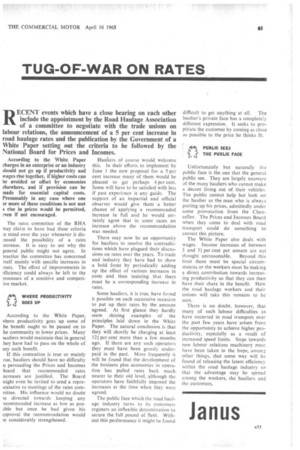TUG-OF-WAR ON RATES
Page 67

If you've noticed an error in this article please click here to report it so we can fix it.
RECENT events which have a close bearing on each other include the appointment by the Road Haulage Association of a committee to negotiate with the trade unions on labour relations, the announcement of a 5 per cent increase in road haulage rates and the publication by the Government of a White Paper setting out the criteria to be followed by the National Board for Prices and Incomes.
According to the White Paper charges in an enterprise or an industry ghould not go up if productivity and wages rise together, if higher costs can be avoided or offset by economies elsewhere, and if provision can be made for essential capital costs. Presumably in any case where one m. more of these conditions is not met rise in prices would be permitted, even if not encouraged.
The rates committee of the RHA nay claim to have had these criteria n mind over the year whenever it dis:ussed the possibility of a rates ncrease. It is easy to see why the Itneral public might not agree. In )ractice the committee has concerned tself mainly with specific increases in :osts. The effect of improvements in :fficiency could always be left to the nocesses of a sensitive and competiive market.
According to the White Paper, vhere productivity goes up some of he benefit ought to be passed on to he community in lower prices. Many tauliers would maintain that in general hey have had to pass on the whole of my such benefit.
If this contention is true or mainly rue, hauliers should have no difficulty n persuading the Prices and Incomes 3oard that recommended rates ncreases are justified. The Board night even be invited to send a repreientative to meetings of the rates cornnittee. His influence would no doubt ae directed towards keeping any .ecommended increase as low as pos.ible but once he had given his ipproval the recommendation would )e considerably strengthened.
Hauliers of course would welcome this. In their efforts to implement by June 1 the new proposal for a 5 per cent increase many of them would be pleased to get perhaps 4 per cent. Some will have to be satisfied with less if past experience is any guide. The support of an impartial and official observer would give them a better chance of applying a recommended increase in full and he would certainly, agree that in some cases an increase above the recommendation was needed.
There may now be an opportunity for hauliers to resolve the contradictions which have plagued their discussions on rates over the years. To trade and industry they have had to show a bold front by periodically adding up the effect of various increases in costs and then insisting that there must be a corresponding increase in rates.
Some hauliers, it is true, have fo9nd it possible on each successive occasion to put up their rates by the amount agreed. At first glance they hardly seem shining examples of the principles laid down in the White Paper. The natural conclusion is that they will shortly be charging at least 124 per cent more than a few months ago. If there are any such operators they must have been grossly underpaid in the past. More frequently it will be found that the development of the business plus economies in operation has pulled rates back much nearer to their old level, although the operators have faithfully imposed the increases at the time when they were agreed.
The public face which the road haulage industry turns to its customers registers an inflexible determination to secure the full pound of flesh. Without this performance it might be found difficult to get anything at all. The haulier's private face has a completely different expression. It seeks to propitiate the customer by coming as close as possible to the price he thinks fit.
Unfortunately but naturally the public face is the one that the general public see. They are largely, unaware of the many hauliers who cannot make a decent living out of their vehicles. The public cannot help but look on the haulier as the man who is always putting up his prices, admittedly under some provocation from the Chancellor. The Prices and Incomes Board when they come to deal with road transport could do something to correct this picture.
The White Paper also deals with wages. Income increases of between 3 and 3+ per cent per annum are not thought unreasonable. Beyond this limit there must be special circumstances or the workers must be making a direct contribution towards increasing productivity so that they can then have their share in the benefit. How the road haulage workers and their unions will take this remains to be seen.
There is no doubt, however, that many of such labour difficulties as have occurred in road transport over the past few years have arisen from the opportunity to achieve higher productivity, especially as a result of increased speed limits. Steps towards new labour relations machinery must have been taken in the hope, amon3 other things, that some way will be found of releasing the latent efficiency within the road haulage industry so that the advantage may be spread among the workers, the hauliers and the customers.
Janus




















































































































